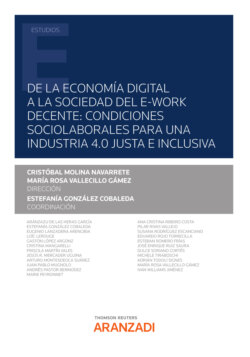Читать книгу De la economía digital a la sociedad del e-work decente: condiciones sociolaborales para una Industria 4.0 justa e inclusiva - Cristóbal Molina Navarrete - Страница 12
На сайте Литреса книга снята с продажи.
Digital transformation in perspective: 30 years of a connected digital economy
ОглавлениеSUMMARY: I. THE ORIGINS OF A CONNECTED DIGITAL WORLD. II. FROM THE NEW ECONOMY TO THE DOTCOM BUBBLE. 1. The new economy. 2. The dotcom bubble. III. THE UNSTOPPABLE RISE OF THE SOCIAL WEB, MOBILITY AND THE DATA ECONOMY 1. The web. 2.0. 2. The rise of the internet giants. 3. The nature of digital business in the early 21st century iv. Present and future of emerging technologies. BIBLIOGRAPHY.
Abstract: The process of digital transformation experienced by the economy and the society as a whole date back decades. It is necessary to approach a historical perspective to place the dimension of the current challenges and the scope that current technologies can have on employment. We focus specifically on the last three decades, taking as a milestone the invention of the Web in the late 1980s. The Web, together with the popularization of computing, made the Internet truly accessible, opening a key stage in human connectivity. In less than a decade, companies started to dominate this new virtual space, developing what is known as the “new economy”, in the transition between the 20th and 21st centuries. The new economy was already pointing, to a large extent, the great issues of the digital transformation of our time, among others the need to focus on cultural change in organizations as well as to adapt to the new demands of the job market. After the abrupt rupture of the expectations generated, the bursting of the dot-om bubble marked the entry into a new period of incessant technological progress together with an ever greater social dissemination of digital technologies. Then we witnessed the emergence of Web 2.0, new management concepts, and the growth of large Internet conglomerates. Finally, the focus is on the so-called emerging technologies (artificial intelligence, robotization, blockchain, etc.), which, to a large extent, are called to radically transform business processes. All this leads us to analyze in perspective the dimension of the current challenges, particularly in relation to labor expectations. We conclude with a call to adopt a democratic governance of technological development and its social implications.
Keywords: Digital transformation, new economy, Internet, artificial intelligence.
